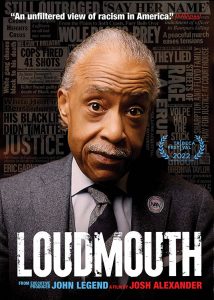
“Loudmouth”
(USA)
Metacritic (5/10), Letterboxd (2.5/5), Imdb.com (5/10)
Rev. Al Sharpton is one of those figures who people either love or hate. Some say he’s a passionate advocate for civil rights, while others contend that he’s a self-promoting opportunist who’s “in the civil rights business.” Regardless of what one thinks, though, there’s general consensus that he’s an undeniably outspoken force, one whose candid character and personality live up to every bit of this documentary’s title. Director Josh Alexander’s profile of this often-polarizing presence seeks to present a definitive look at Sharpton’s life and work, but, unfortunately, it misses the mark in several respects. To begin with, the material is poorly organized, jumping around without a well-defined sense of direction and weighed down by an excess of narrative minutiae and incidental archive footage. (There’s quite an irony in that, too, given that Sharpton contends in one of the film’s monologues that minority concerns are often muddled in the media, a problem itself echoed in the content of this offering, much of that attributable to those aforementioned issues.) Moreover, there’s not much in the way of a backstory here, providing viewers with little meaningful insight into Sharpton the individual, his motivations, the influences that drive him and his life outside the public eye, elements that undoubtedly play an important role but that ultimately receive little more than passing attention. Consequently, by not digging deeper, the picture comes across largely as a somewhat overlong checklist of career accomplishments and a diluted examination of the more significant messages for which its principal stands. Also, without a more scrutinous analysis of the concerns of the protagonist’s critics, and with the regular inclusion of what could be seen as self-congratulatory monologues, the film tends to lean toward being a work of deftly spun, well-polished adulation. That’s not to suggest such admiration is undeserved, but, given the often-divisive nature of this highly visible public figure, its arguably one-sided presentation in this regard feels somewhat unbalanced. “Loudmouth” could have indeed been a compelling look at an iconic individual, but it instead comes across as a tribute that’s more concerned with being respectfully reverential and not offending than with providing meaningful, sincere enlightenment.




Leave A Comment